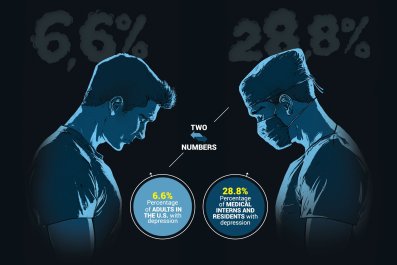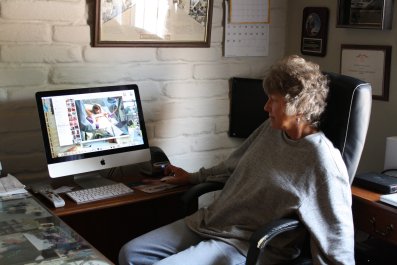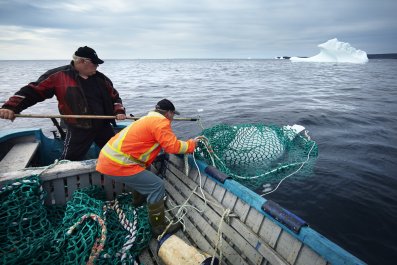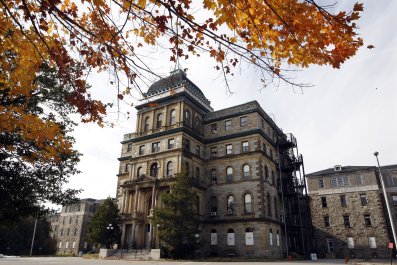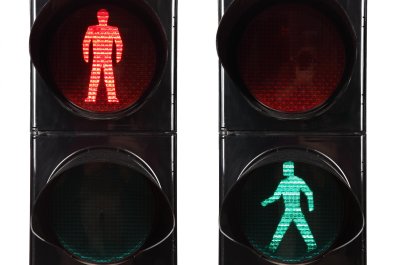Marvin Roberts was dancing. The wedding reception inside Eagles Hall was still swinging when the teenager arrived late on a cold October night in Fairbanks, Alaska, in 1997, court papers say, packed with Alaska Native guests from remote villages all over the state. Around 1 a.m., he grabbed a partner and headed for the dance floor. The high school valedictorian was ready to kick back after spending the summer on a wildfire crew putting out blazes and then going on a two-week river trip with his father that fall, during which Roberts shot a young bull moose from 200 yards with his .30-30 rifle.
Around the time Roberts was on the floor with his third dance partner, a woman smoking a cigarette on a balcony a short drive from the hall heard a series of hard smacks and a young voice call out, "Help me! Help me!" she later testified. Over an hour later, passersby found John Hartman, 15, lying beaten near to death not far from that balcony, his lighter and a pack of Big Red chewing gum on the street beside him.
Later that morning, police picked up a drunken Eugene Vent, who used to play on the high school basketball team with Roberts, after a hotel clerk said Vent had waved a gun at him earlier that night. Inside the Fairbanks Youth Facility, a detective began a long interrogation of Vent that included feeding the drowsy 17-year-old facts about the Hartman killing and the names of three young men he wanted Vent to confirm had joined him in the attack on Hartman.
Over three interviews that day marked by Vent repeatedly slurring, "I don't remember," and answering the detective's leading questions with, "I was drunk," he eventually gave a jumbled confession in which he named himself, Roberts and two of their former teammates—Kevin Pease, and George Frese—as the assailants. Hartman died at Fairbanks Memorial Hospital the next day, and Vent, Roberts, Pease and Frese were quickly charged with murder.
While the four men—three Alaska Natives and a Native American—were held in segregation together in a Fairbanks jail following their arrest, they agreed to remain united. "We called a meeting, and we said we know we're innocent and we're not going to ever say that we're not and take a deal," Roberts tells Newsweek. "We're going to fight this to the end."
Related: 'Making a Murderer' Rape Victim: How I Feel About Steve Avery
At their trials, the woman who heard the cry for help testified that one of the attackers spoke with a distinctive Native accent. A man testified that he saw Roberts and the other three attack another man earlier on the night Hartman was killed—even though he was drunk, high and 450 feet away.
"I thought it was complete bullshit. I thought it was dirty," says Roberts, still angry over the now-discredited evidence that put him in prison for 18 years. "They fabricated to make it look how they wanted it to look." Roberts and the other men—who came to be known as the Fairbanks Four—were each convicted of murder in 1999 and sentenced to prison.
The Fairbanks Four became a major civil rights cause for many in the state. Don Honea, the ceremonial chief of over 40 villages from interior Alaska, told the Fairbanks Daily News-Miner in 2008 that "those boys were railroaded," and he added that Natives feel like they never get a fair shot from cops and courts in Alaska, where the Native population has faced a long history of discrimination that includes businesses posting signs that read, "No dogs, No Natives" in the 1940s. At the time of the Hartman murder there was also "a lot of racial tension" between Fairbanks's poorer and mostly Native neighborhoods, and the rest of the city, says University of Alaska Fairbanks journalism associate professor Brian O'Donoghue, whose long-term investigation into the killing of Hartman—who was white—turned up evidence that buttressed the four men's claims of innocence.
Defense attorneys for the Fairbanks Four filed appeals, but they were all rejected in the courts. Then new evidence surfaced. A star government witness recanted and said police coerced him. The biggest breakthrough came in 2012, when a convicted killer confessed he was there when his friend beat Hartman to death.
Late last year, state judge heard the new evidence during a five-week hearing that ended in November. The men knew there was a good chance they'd be exonerated, but they also knew that the judge might take over six months to issue his ruling, so when the state offered a deal that would overturn the convictions and instantly free them, they signed. The catch: In order to settle, the Fairbanks Four gave up their right to sue the state and withdrew their claims of prosecutorial misconduct, both concessions demanded by the state that legal experts called arguably unethical and reprehensible. "If you were in these defendants' shoes, the pull of getting out of prison is just so strong that you'd be willing to sign just about anything," Northwestern University law professor Steven Drizin tells Newsweek, adding that it's unusual for prosecutors to force convicts to sign away their right to sue in exchange for freedom.
Roberts had been paroled about six months before that hearing, so for him, the decision to sign the settlement that would free the three men he'd vowed to fight with until the end was the most difficult of his life, since he was out and able to sue for compensation. "It was an all or nothing deal. We all signed it, or nobody," Roberts says, still upset over the impossible choice forced on him.
"All the cards were in the state's hands. They'd been wrongfully convicted of a crime and had served 18 years, and they just wanted to be out with their families. The state knew that and took advantage of them," says Victor Joseph, president of the Tanana Chiefs Conference, which worked to keep the Fairbanks Four's cause in the public eye.
Related: 6 Books to Satisfy Your 'Making a Murderer' Obsession
Drizin, a former director of the school's Center on Wrongful Convictions, says the issues of whether the state can meet its burden of proof for conviction and whether a defendant should be compensated for years of incarceration should be kept separate. He predicts that while the settlement and the men's release from prison will give the community short-term joy, it will leave a "long-term bitterness."
Prosecutors fought to keep the Fairbanks Four in prison all the way through that final hearing and repeatedly attacked each bit of exculpatory evidence. They bashed the recanting of their main eyewitness, Arlo Olson, who originally testified that he stepped outside for a cigarette and saw the Fairbanks Four knock down a man, yell, "Give me your fucking money, bitch!" and drive away earlier on the night Hartman was killed.
Olson signed an affidavit in 2014, claiming police coerced him into testifying he saw Roberts, Pease, Frese and Vent assaulting that man after getting out of a blue two-door car, even though he told investigators the car was a beige four-door and he didn't recognize the men. State lawyers argued that Olson, who later did time on a domestic violence arrest, was "miserable in jail because he is harassed or assaulted or threatened or intimidated by people who know him as a 'snitch' or 'rat' for his testimony" against the Fairbanks Four, and that his recantation therefore should be discounted.
State lawyers also sought to undermine the confession of William Holmes, a convicted murderer serving two life sentences in a state prison 150 miles from San Diego, who came forward to say he was driving when he and his friends were cruising around Fairbanks looking for "drunk Alaska Natives" to attack that night, but that he stayed in the car when they got out and beat Hartman to death. "Holmes claims no direct knowledge of the attack on Hartman. He did not see it, hear it or participate," the state wrote in court papers, arguing that Holmes likely made the confession to retaliate against the man he fingered as Hartman's killer.
The day the deal was reached, the Alaska Department of Law put out a statement declaring, "This is not an exoneration. In this settlement, the four defendants agreed they were properly and validly investigated, prosecuted, and convicted."
In his early years behind bars, Roberts passed time by walking laps in the prison yard or lying on his rack, losing himself in memories of past river trips and that hunt with his dad before his arrest. But at some point he started focusing on the future and how he hoped to see those same waters again. "As soon as the river opens up and the ice clears, I'll be on the river," says Roberts, now working as a maintenance man for a Native corporation in Fairbanks. "Get some gas, jump in a boat and drive. There might be a destination somewhere, or we might just go 5 or 10 miles up the river and enjoy life."
Roberts says he pushes himself to look forward, to avoid anger, but he's aware of how much of his life was stolen from him. When asked what he missed the most while in prison—relationships, hunting, basketball—Roberts interrupts, irritated for a moment by the reminder, and says, "I know what I've lost."




